US election 2020: The farmer helping Mexican immigrants
- Published
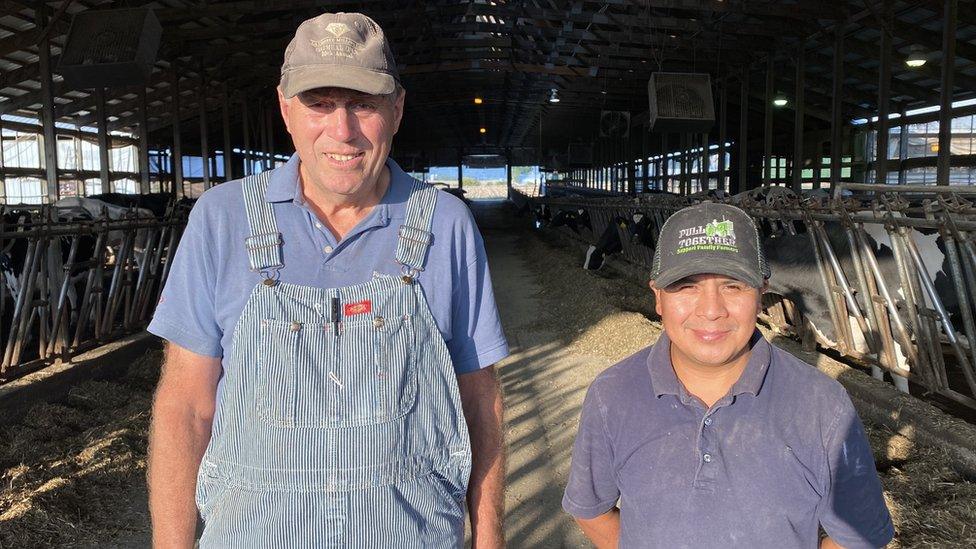
John Rosenow (left) makes trips to Mexico to meet relatives of his workers like Roberto
Ending illegal immigration was a signature promise when Donald Trump swept to power in 2016. But on the ground it's a more complex picture - and for one farmer in Wisconsin, undocumented workers have been a lifeline. And he's going to extraordinary lengths to repay them.
The paved road suddenly ends and all the numbers and street signs disappear along with it, turning into a gravel path cutting through green and golden pastures.
On one side of the path, there are small signs with slogans that are difficult to read from the vehicle.
"It is about the climate," one seems to say. "It is about you," is written on the next one.
Soon after, there is a much larger one, hanging on a fence: "Vote November 3. Wisconsinites for Biden."
It is the first sign in several miles showing support for the Democratic presidential candidate.
"My wife is the one with the signs. I used to be that kind of guy. But now I just put them up," says farmer John Rosenow amidst laughter, at his house in Waumandee.
Rosenow says he is an exception in this small community, one of the counties in Wisconsin that gave President Donald Trump his surprise victory in 2016.
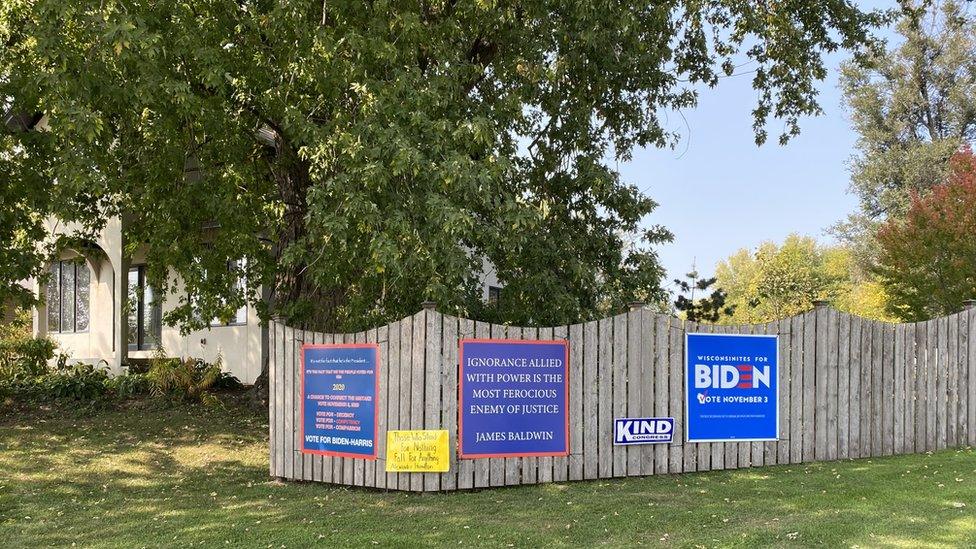
In Rosenow's neighbourhood, Biden signs are a rarity
Wisconsin had not voted for a Republican presidential candidate since the 1980s but it went narrowly for Trump, in part because of strong support for him in rural enclaves like this one.
Rosenow's family is well known in the area for being part of a project that helped knock down barriers between the US and Mexico. They call it Puentes [bridges].
"This is Roberto driving by. You'll meet him sometime. Last night we went to play golf together. He's got the golf bug really bad… so do I," Rosenow says, pointing to a man driving a loud vehicle down the road.
Mexican immigrant Roberto Tecpile has worked for six years in this dairy farm.
"He's been here since 4am, feeding cows", Rosenow says at around midday. A few hours after that, Tecpile will still be at the farm.
On a September morning, Rosenow's business, Rosenholm Dairy, seems to be operating with clockwork-like efficiency. But the situation now is drastically different to what they experienced in the 1990s, when nobody seemed to want to work here.
"It was 1998. We could no longer hire people locally so we decided reluctantly to hire immigrants. I hired the first one through a company out of Texas," the farmer remembers.
"He worked for two months and he was wonderful. But he was lonely because he was the only Mexican within 100 miles, so he left".
It was the beginning of an inflow of migrants, many of them undocumented. They ended up saving Rosenow's farm and that of many others in this corner of Wisconsin, during a time of acute labour shortages.
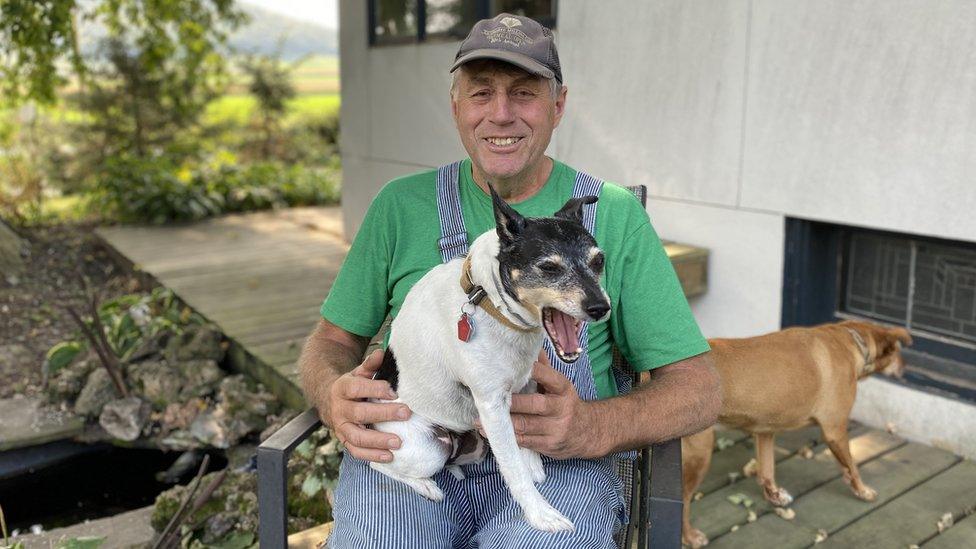
The number of immigrants working in the dairy sector nowadays is difficult to establish. A national study, conducted five years ago for the National Milk Producers Federation, estimated they represented 51.2% of the labour force and that farms employing immigrants provided 79% of the US milk supply.
Mexicans solved a crucial problem for the farmers in Waumandee - finding workers willing to perform hard physical tasks from 4am to 5pm or even later, in temperatures that can fall below -10C (14F) in winter.
But their arrival presented a new challenge.
"I realised early on that not knowing the Spanish language or anything about the culture, it was a real negative for me. If I was going to be a good employer, I needed to know all that stuff," Rosenow remembers.
He and other farmers approached the local high school Spanish teacher, Shaun Duvall, for help. And she proposed that they went on an "immersion trip" to Mexico.
"It was just an eye-opening experience," he recalls.
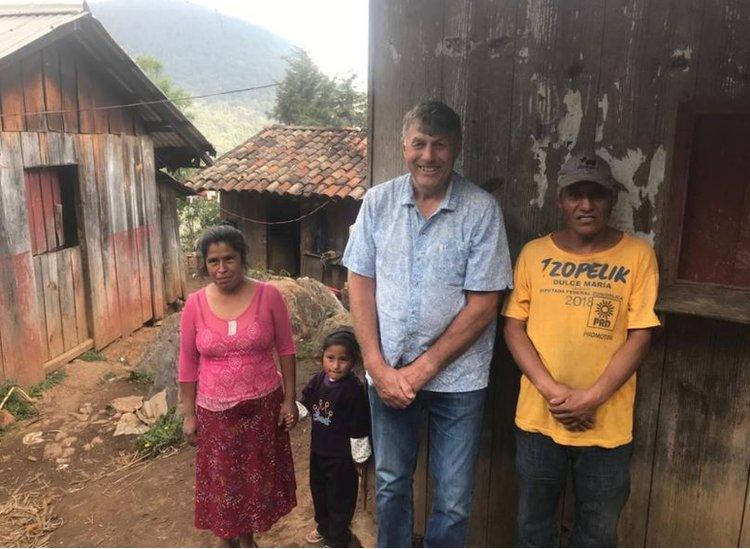
Rosenow has travelled to Mexico 10 times
Fifteen farmers joined on the first trip, which included classes in the morning and in the afternoon. On one of their free days, it occurred to one of the farmers that they could go meet the relatives of their Mexican workers - a visit their Latino employees can't risk.
It was just the beginning of something bigger.
Rosenow helped to raise money to help support the initiative and get more people to go. Up to 200 people, mostly farmers, have made the trip now. "And I've been down there nine or 10 times," he says.
A cheerful Mercedes Falk shows up in the farm, and many of the Latino workers turn up to say hello.
"Hola! Shall we meet later at English class?"
That same afternoon she was due to give a free class to interested workers at the farm's premises, another initiative spearheaded by Rosenow.
"I've been to Mexico four times now," says Falk. "It is heart-breaking especially to hear moms talking about how much they miss their sons. One mom in particular she said 'It's been 15 years and I have not seen him in that long'. And you can just feel her heart breaking and that part sticks with you."
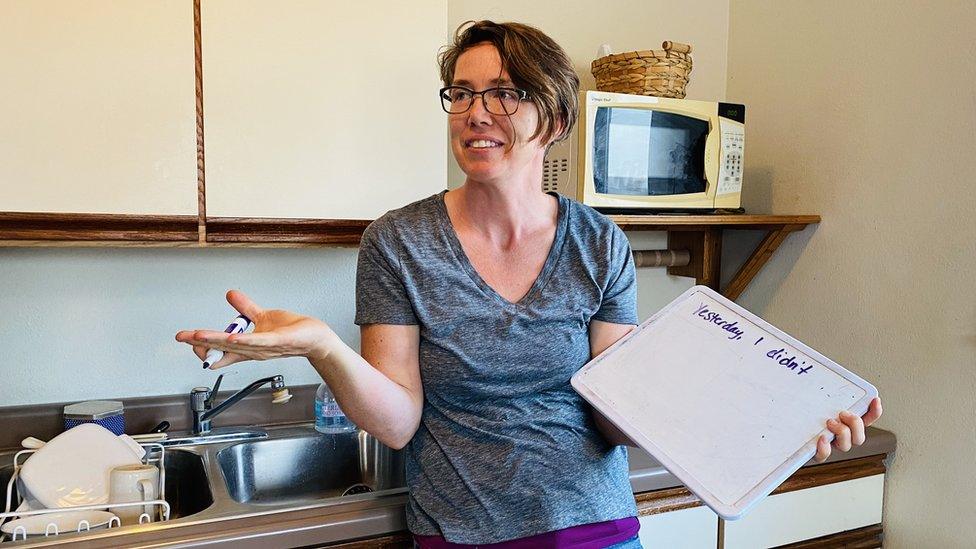
Mercedes Falk teaches English to farm workers in the area
Falk took over Puentes, the NGO created to run this programme, in 2017, after falling in love with country life and leaving her birthplace in the Milwaukee area.
The trips have changed substantially since they first started.
The main objective is no longer to take Spanish classes but to visit their employees' families. "We usually spend seven days, visiting families and doing some tourism in the area close to the rural villages where they live," Falk says.
"I do my best to arrange all the visits, but… it is Mexico, everything could change," she says laughing. "That also helps the farmers to understand the mentality of their Mexican workers, they live day by day".
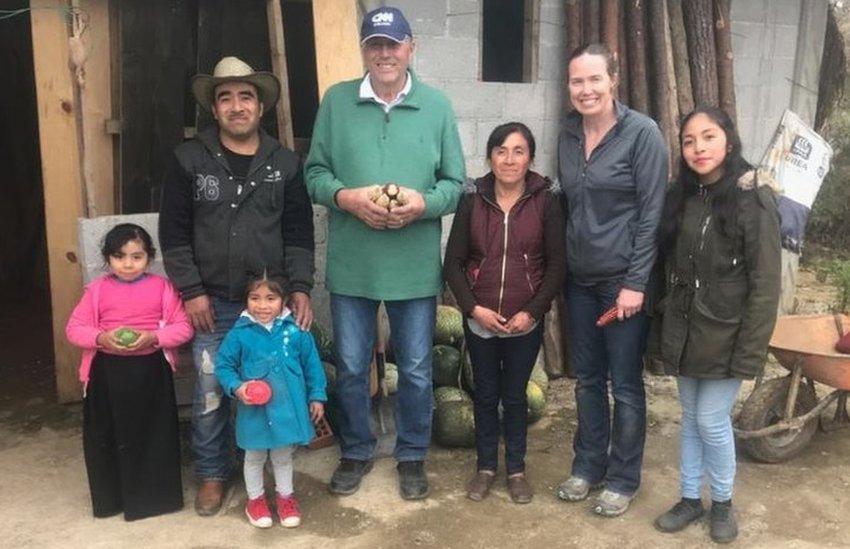
Rosenow and Falk on a trip to Mexico
The immigration controversies under President Trump have made the programme even more relevant in this community.
Waumandee voted for Trump in 2016, choosing him over Hillary Clinton by a margin of 188 votes to 87.
Several of Rosenow's neighbours have already placed Trump signs in the doors of their houses or businesses.
But the social tensions felt in other parts of the country are not immediately apparent in this rural corner of America.
"I understand that Trump supporters are actually good people and I get along with them. If our cows got out in the middle of the night, they would be the first ones here to help us put them in," Rosenow says.
Still, Trump's election in 2016 brought some nervousness to the area.
Many migrant workers returned home soon after, leaving some Wisconsin farmers again facing labour shortages.
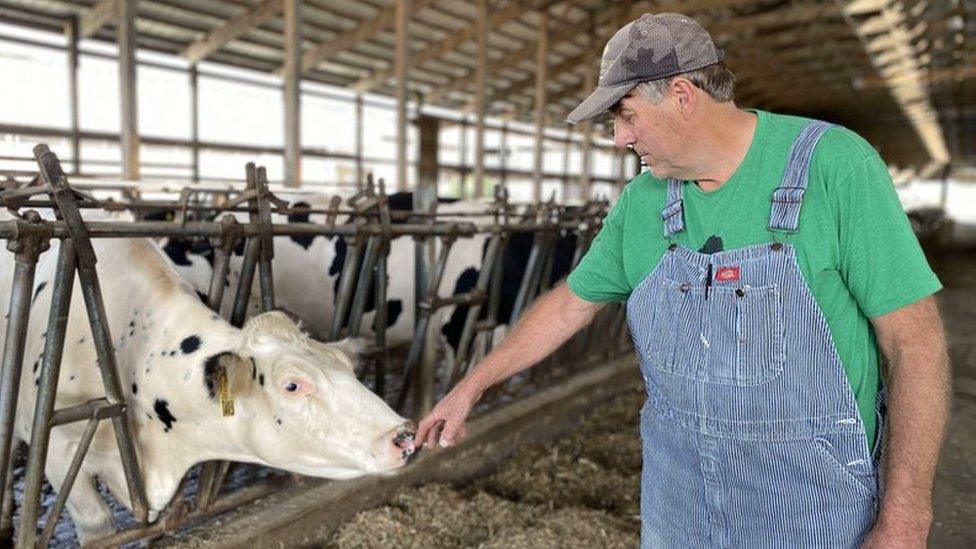
Rosenow sees the deep political division in his own community
"They need workers. If Trump takes them away… it will create problems," Roberto Tecpile says.
The Trump administration has cracked down on illegal immigration because it believes it takes American jobs and drives down wages. As president he followed through on his campaign promises by deporting thousands - a move popular with many of his supporters.
But there are still millions of undocumented immigrants, many of them working in industries like agriculture that rely on them.
Roberto Tecpile first came to the US when he was single, risking his life by walking across the desert for two days and two nights. He kept returning, now as a married man. Last time he departed Mexico, he left behind an infant daughter and two other children.
"We can only live like this. When you have family, you have more responsibilities. There is no money there," he says about his home in Mexico's Veracruz state.


One of his colleagues, Moises, who is 27, says he is planning to return soon to Mexico after several years in this farm. "I am leaving before the cold arrives. It is very hard," he says, nervously. He is not sure he will come back.
Immigrants frequently take the hardest jobs in the dairy industry.
A 2009 study from the University of Wisconsin found that they were often relegated to routine, lower-paid tasks, like milking the cows or cleaning manure in the barns, a report at the Milwaukee Journal Sentinel said. Dairy workers averaged 57 hours of work a week and fewer than five days off each month.
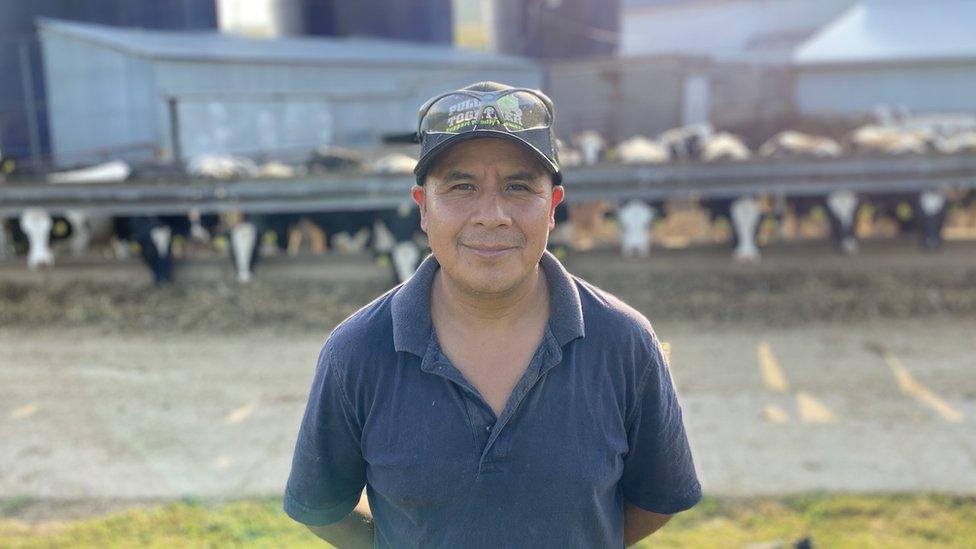
Tecpile, from Veracruz, Mexico, has worked on the dairy farm for six years
As Tecpile raises a fence in the field, under the blazing sun, his mobile phone rings and you can hear a voice speaking a language I can't understand.
"It is my wife, she is speaking in Náhuatl [an indigenous language of Mexico]," he says.
"Órale, are you with your boss or with who?" his wife says, now in Spanish. She starts to share some of her concerns in a timid but sweet voice. "Sometimes I am worried about my husband, and about Kevin, my son."
Kevin is a teenager who crossed into the US to follow his father's steps in Wisconsin with the help of "coyotes" [people traffickers]. Today he is one of the few employees in Falk's English class, and one of the most attentive students.
"He likes the work here, although it is hard," Roberto says about his son. "Still, I think he will eventually tire of it."
Roberto, however, plans to grow old in this country. He thinks that Puentes is an unusual and welcome initiative. For Mercedes Falk and John Rosenow, it is the only possible way forward.
"I think anyone that gets a chance to see the other side of the story," says Falk, "they can't help but walk away with a different perspective and empathy."
Tamara reports for BBC Mundo, a Spanish language news services throughout the Americas